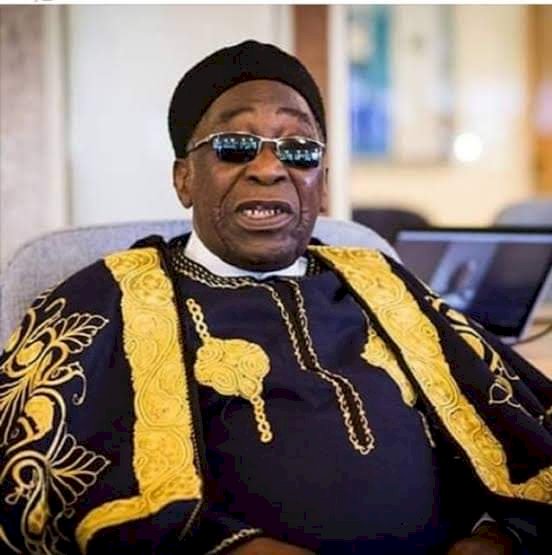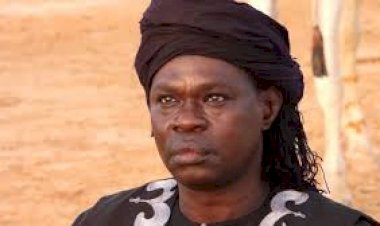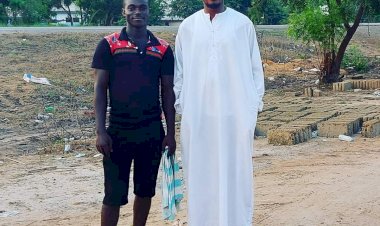Late Maitama Sule Stands On Revolution In Nigeria (Dan Masani)

My belief has always been that the best organisation is a combination of the two; the old and young. You need the experience, the maturity and the wisdom of the old as well as the dynamism, the radicalism and youthful exuberance of the young.
And that is why, I don’t believe, I don’t buy this idea of the new breed alone.
As you must have heard, I keep saying new breed without the old breed will breed greed. Throughout history you will find out that the best or the most successful governments or organisations have this kind of combination.
The old cannot do it alone, nor, can the young, you need a combination of the two. They compliment each other.
In the same vein, we have to go into history, the purpose of history is to know the past in order to adjust the present and plan for the future. If you ignore the old breed you are wiping out a whole generation and therefore, creating a vacuum. Nature does not want a vacuum. Life is a continues thing, there must be continuity. Because of the importance of history, it is necessary to go into the past. How did we start? What was the First Republic like? Who were our founding fathers? What did they do?
The First Republic, we know the problems that we had, we had problems, but because of the attitude of the founding fathers, because of their patriotism, they were able to overcome and we remain one. Those founding fathers worked together.
Before independence, I think in 1952, the motion moved by Chief Enahoro for immediate Independence of Nigeria. This motion was amended by the northern government and leaders. The norms and values, which they left for us, have been thrown overboard. We are no longer what we were. Ours was a decent country. There was respect for elders and constituted authority. Today, even the institution of family has broken down, respect for elders and constituted authority that used to be a cardinal principle in our society is now at its lowest ebb. Honesty while does not pay, has became meaningless, symptoms of revolt loom large on the horizon. In short today there is meaninglessness in philosophy, insecurity in polity, immorality in society, chaos in politics, corruption in economy, and even frustration in art and lack of creativity in literature. We have lost that leadership that made us great in the past. We are no longer what we were.
During the unfortunate civil war, may God grant that we may never experience such a thing again, I remember, Shagari and I were sent on a road to campaign for the federal cause. On our return, Shagari and I were comparing notes and he told me that a friend of ours in Geneva told him something very serious. He said, “Look, we know why you are out, you have come to seek support and sympathy for your cause, but we don’t care about you, all we care about are your resources. If we could get robots to exploit your resources for us to enable us to develop our economies we wouldn’t mind getting you all eliminated. But remember one thing, you Nigeria are a special case if you could have 15 to 20 years of interrupted peace and stability you will be a great country. Because you have the resources, both human and mineral and your people are intelligent and hard working. Within that period of 15 to 20 years, you will use your brains, work hard, exploit your resources and develop your economy and in no time, Nigeria will be a strong economy to be reckon with. A developing economy needs a market, you have no problem looking for a market, your population alone in Nigeria will provide that market. But even the market at home will be expanded, the entire West African region will be your market, but that will not go well with us because you will be a thorn in our flesh.
You just need to develop your agriculture because it will be there forever. If you develop agriculture, you will be able to feed not only Nigeria but also the entire West African region. Any country that can feed itself has more than half its problem solved. You in the northern belt have great agricultural land.”
Sardauna before he died had a master plan for developing agriculture. He said he wanted to make Northern Nigeria green throughout the year. During the rainy season, there will be rain; during the dry season, there will be irrigation because he planned to have all the major rivers in the north dammed to provide water for irrigation. In that case we will be green throughout the year. That is what we have been appealing to the governors, ‘get that plan, update it, and implement it. Forget your political differences, come together, in politics, in the development of the economy of the country don’t bring too much politics.’
I remember in the First Republic, we used to have an economic council. The Prime Minister was the chairman of the council, the premiers of the regions -Sardauna, Okpara, Akintola – were members of that council and a comprehensive economic plan for the entire country will be discussed; a decision will be taken and every premier of every region will go and implement that part of the plan. It’s a master plan embracing the whole country. That was what they used to do.
Now that we have northern governors, let them bring this. Audu Bako did it, this Kadawa irrigation scheme was not his idea, he got the idea from this master plan of Sardauna and he implemented that aspect which affected Kano and he made it. Luckily, he was very much interested in farming and he was a good farmer and a good intention. In fact, if what Audu Bako had started had been continued, we would have been feeding the entire country by now.
It is sad that when we look at our budget we find that very little is given to agriculture, very little. Sometimes when you have your, is it sports? World Sports. The amount of money you allocated to that sport is more than the amount allocated to agriculture.
Two things are necessary in a developing country: agriculture and education. As I said earlier, if any country can feed itself, more than half of its problem is solved. As regards education, the level of development of a nation is the level of its education. Unfortunately, we don’t pay attention to this. As regards education, UNESCO recommended that developing countries should spend about 23 per cent of their budget on education. All the West African countries, both Anglophone and Francophone are spending much more than Nigeria. We are spending about 6 per cent instead of 23 per cent and that is why we have been having problem with ASUU. We have to do something about this; we have to do something about agriculture
I went to Ghana sometime ago, I was with the vice president and he told me that they had got oil, but that before they started getting money from the oil, they had already got their own plan. ‘We will not be like you. We will invest in agriculture, education, roads and hospitals and of course security, and we will keep some money reserved for a rainy day. In your own case, you got the money and you started enjoying the money and spending it, we will not do that.’
I think we should do something. Nigeria would have been an industrial country. In 1960, when we went to the United Nations, the Prime Minister asked me to remain behind to attend the remaining session and discuss with an Iron and Steel company, Westinghouse. They agreed to establish an Iron and Steel industry for us. Of course, we agreed; back at home. But then there was a problem, there was a problem in the east again, they wanted the industry to be cited in the east. The experts recommended Ajaokuta because it has the Iron ore and had the coating coal, which they needed for melting the Iron ore. They argued that they too had coal but my argument was that ‘your coal was not coating, but the end users, big companies are in the east, but all the same’. This dragged on for a long time. One American ambassador advised me and said look this thing has become political and you need a political solution, all you can do is to break this industry into two; have the plant in Ajaokuta, produce the iron bars in Ajaokuta and send them to Ontisha where they would be rolled into various sizes and shapes. They too will have something. I went with that proposal and it was accepted. Unfortunately, before it was implemented, we had the civil war. The West turned their back against us, the Russians helped us, and at the end of the day we became too emotional and gave the Russians the contract to build our Iron and Steel industry and we haven’t got it up till now.
There was a time when I advised Babangida and said “let us swallow our pride and invite the Americans to be either partners or to be management in order to build this industry because we need it as a developing country. If we had implemented it we would have been producing cars by now. We need sincere, good, responsible leadership with the interest of the country at heart. First thing we should do is to look at agriculture, education, power, so that you can have industries.” For instance in Kano, 80 per cent of our industries have been shut down because there is no power. It is a shame driving from Kaduna to Kano, you would have seen it. Kaduna to Abuja is an eyesore; my Goodness! So we need to do this.
But I beg you please, you the politicians to please learn to respect one another in spite of your differences. This campaign of calumny, abuse, should not be allowed to continue because you cannot produce good leaders this way; you must be responsible. Let me tell you it is not for nothing that God has brought us together in Nigeria. Different tribes, different cultures, different religions and even different climatic conditions. I believe that God has brought us together so that we may learn to live together, cooperate with one another. Because of the role that God wants us to play in Africa and the world. Allah wants us to play the role of leadership. Unless if we are united at home, unless we live in peace with one another, nobody will respect us or accept our leadership outside. And when people keep saying we have different religions, has India not got different religions and other differences, up to a 100 times as many as we have in Nigeria? But they have been able to make it. As far as I am concerned, tribalism or religion should not be a barrier in our unity or development. Tribalism for example, if you go to the United Nations today, you will see in front of the UN building a big board with a verse from the Holy Quran and I believe that there is a similar verse in the Bible. That verse is saying, ‘O you people’; not O you Muslims or O you believers. God is addressing mankind, that is the verse in front of the UN building. Allah says I have created you as a man and a woman and divided you into tribes and races so that you may understand one another. Not that you may quarrel or fight one another. No one is greater than another in the eyes of God except he who is more pious and more useful to his fellow man. So the idea of creating us different tribes or different races belonging to different religions is not that we should fight one another, it is to understand one another. What is the wisdom in this? Allah is the all-wise. If all of us have been the same, and if all peoples of the world today have the same colour of the skin, if we wore the same costume, if we spoke the same language, nobody will want to know about another because we will assume after all we are the same. But the fact that we are different; in every man there is what is called inquisitive instinct; that inquisitive instinct will begin to urge you to find out why is this man different from me? Why is he wearing different clothes? Speaks a different language? In trying to find out, he too will be asking himself similar questions about you and in trying to find answers to your questions, you will come close together. There begins the understanding that you need cooperation. Variety is the spice of life. So people say, Allah (SWT) loves us so much, he wants us to enjoy this life and that is why you have different people with different ideas; it is the culmination of these ideas and differences that brings about development and progress. That is why you find cosmopolitan towns like Lagos, Kano, Onitsha are more progressive than other places. Kano is certainly much more progressive than Sokoto or Katsina or anyone because there are different peoples leaving in that area. The cross fertilisation of different ideas from different peoples brings about development and progress. So I refuse to agree that tribalism should be a barrier to our development.
That is why I continue to say that what we need in Nigeria today is leadership, to lead not only Nigeria but also the rest of Africa. We want leadership, not rulership. We want leaders with the fear of God. Leaders will not lie; leaders will accept in public what they have accepted in secret. Leaders with a vision, not a blurred vision, leaders who look at the plight of the common man with the eyes of a patriot no with the eyes of the privilege few. Leaders who know that they are no longer equal to the exigencies of their nations and will have the prudence of handing over to others before they forfeit the admiration of their country men. We want leaders who believe that they will one day stand before God and account, not those who would want to sit tight and remain there until dead do us part like Church marriage. We must have such leaders. To turn the table, we need to revisit the past and revive the past glory of Nigeria. We need such leaders; in order to have such leaders, we must have a revolution. I know the word revolution scares you (general laughter). We must have a revolution. I am not calling for a bloody or violent revolution. No! I am not calling for a Mao Tse Tsun kind of revolution in China where over 70 million people were killed.
I am calling for the kind of revolution led by Mahatma Ghandi with his philosophy of Satyagraha; non violent resistance. I am calling for a bloodless non-violent revolution. I am calling for a change of attitude, real re-orientation. Who are to bring about this? You are the answer. You are the panacea to our ills. You are the solution to our problems; you are the vehicles for change; you are the vanguard of this revolution.
The future is yours; you can make it or mar it. If you succumb to the machinations of greedy irresponsible political leaders, you will inherit a bad future and you will be bad leaders in the future. Make no mistake about it, you are the future leaders whether anybody likes it or not. You are the change, you are the future, and you are the answer. But, let this get into your head, you need the elders. As I said earlier, you alone cannot make it. Listen to the elders; seek their advise; in all countries of the world, there is what they call an invisible government. It is not the government, but there are some elderly experienced people who have no interest in getting any position or money but they have interest in their own country, they want to see their children and their grand children become good leaders, respected leaders. These are the people that sit together and discuss the country and advice the government. In every country of the world, they have this, you must have this too. Today, you have oil in Nigeria; I am sad because most people don’t know how it all began. Before me, Pa Ribadu, the first Defence Minister was the Minister of Mines and Power in charge of oil. I succeeded him at independence. I was the First Minister of Mines and Power in charge of oil of Independent Nigeria and I lasted in that ministry longer than anybody. I was there from 1959 to 1966. I knew how it all started. Shell came to look for oil in Nigeria; Nigerian government had to give its contribution in the search for oil. The central government of Nigeria was told to hand that money. It was northern Nigeria money kept with the crown council that was used to pay Nigeria’s contribution.
The colonial masters said we should have this written either as a loan or a contribution or as a share in the oil, so that when oil was found eventually, we will get some benefit. Pa Ribadu and our leaders said No! We belong to the same country; if our money is used to develop any part of the country, then so be it, we are all brothers.
by Sani Tukur.
PREMIUM TIMES


















































